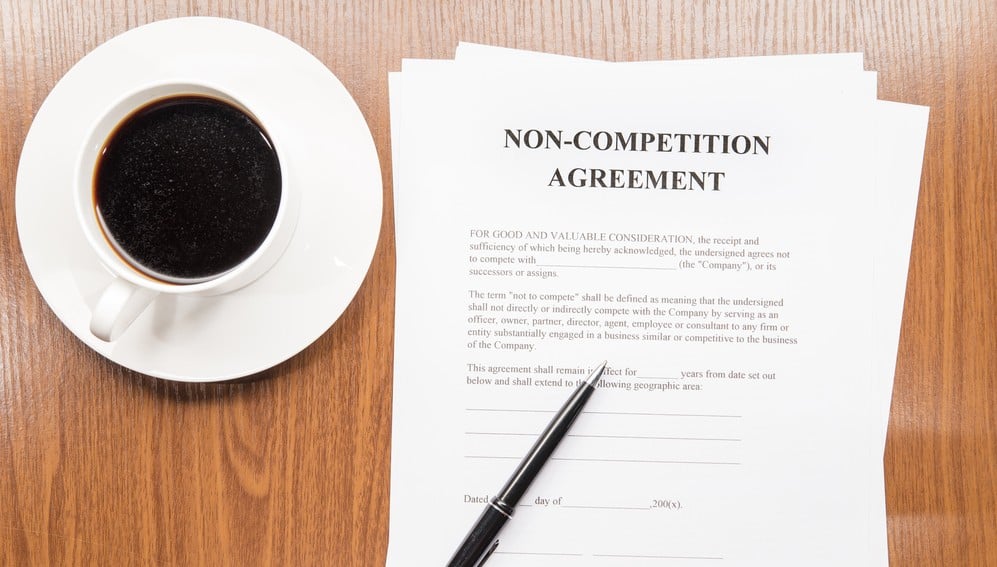The use of employee noncompete agreements is on the rise, everywhere from the tech industry (makes sense) to the sandwich industry (seriously?). However, noncompete agreements have their limits, and certain unnecessarily stifling terms may be unenforceable in a court of law.
Noncompete clauses: The basics
As the name suggests, a noncompetition agreement is a signed contract between two parties wherein one party agrees to certain terms that will eliminate or lessen the other party’s risk of damage to its brand or product through market dilution. In other words, one party has developed an awesome idea or product, and the other party has to agree not to copy the idea or use the idea to create its own awesome product.
Noncompete agreements generally contain two major restrictions: geography and time. For example, if an employee works at a technology company selling innovative agriculture products to the western half of a state, a noncompetition agreement might prevent him from creating or selling similar agricultural products or ideas in that same half of the state for a year following the end of his employment with his current company.
In nearly all U.S. jurisdictions, noncompetition agreements must not cross the fine line separating permissible business protection from unlawful restraints on trade and the freedom to contract. Because of this, courts routinely strike down noncompete clauses that are unnecessarily far-reaching in nature. The cutoff points vary from state to state, but it is not uncommon for a court to refuse to enforce a noncompete clause that covers an entire state or lasts much longer than one year.
Excessive noncompete agreements popping up in more and more industries
With the proliferation of readily-accessible “legal” documents on the web, more and more businesses are deciding it makes sense to have every employee sign some sort of noncompete agreement, regardless of actual risk of market dilution, unfair post-employment competition or secret-spilling.
The result is that noncompete agreements are no longer limited to industries like technology and business – industries with legitimate trade secrets to safeguard. In fact, yoga instructors, summer camp counselors and sandwich makers are now being faced with seemingly ironclad agreements.
The appropriateness of such agreements depends heavily on the nature of the trade and the value of the secrets being protected. A noncompete agreement in the sandwich industry might make sense if the restaurant is nationally known for a particular recipe, sauce or ingredient (think: Big Mac secret sauce). By contrast, a noncompete agreement at a traditional deli serving basic turkey and cheese sandwiches is probably overkill and, in all likelihood, unenforceable.
With this excessive noncompete craze comes the inevitable problem of unemployment for those looking to make a lateral move within the same industry. For the yoga instructor under a strict noncompetition agreement, it may be difficult to find work in the same city without violating the clause or worrying about the possibility of facing civil penalties.
Remember, the company that wishes to take legal action against a former employee must prove actual, quantifiable harm to the business in order to prevail. This requirement may help soften the pressure placed on employees fearful of facing untold liability for changing jobs within the same industry, particularly if no actual harm to the former employer has occurred.
Facing a noncompete agreement? You can negotiate.
One of the best pieces of advice to any new employee facing a noncompetition agreement is to stop and carefully read the terms before signing. If the language feels uncomfortable, it is probably too expansive and should be negotiated.
If you live in a state like California, you can bring up the fact that state law generally does not allow noncompete agreements in any form, though it wouldn’t be enforceable anyway. In other states, the noncompete agreement must fit within the requirements described above, i.e, be reasonable in scope and length of time. If you are facing a ridiculously overreaching noncompete agreement, you can gracefully mention to your new employer that the terms seem unfair and likely unlawful. You could also ask why the business feels it needs to overprotect itself by unreasonably restraining employees. But if the conversation gets to this point, it’s probably a red flag that you should find a job elsewhere, if possible.
Depending on the industry and the position, it may be wise to hire an attorney to review the agreement. Hourly workers who might not think they can afford an attorney can now speak to one for a relatively low fee — $39 for a phone call — to review agreements and get advice through the new Avvo Advisor service.
Download the Avvo Advisor App and, for a limited time only, use promo code Nakedlaw to get a free Advisor session.
Related articles:




